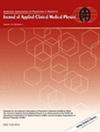Evaluating auto-contouring accuracy in reduced CT dose images for radiopharmaceutical therapies: Denoising and evaluation of 177Lu DOTATATE therapy dataset
Abstract
Purpose
Reducing radiation dose attributed to computed tomography (CT) may compromise the accuracy of organ segmentation, an important step in 177Lu DOTATATE therapy that affects both activity and mass estimates. This study aimed to facilitate CT dose reduction using deep learning methods for patients undergoing serial single photon emission computed tomography (SPECT)/CT imaging during 177Lu DOTATATE therapy.
Methods
The 177Lu DOTATATE patient dataset hosted in Deep Blue Data was used in this study. The noise insertion method incorporating the effect of bowtie filter, automatic exposure control, and electronic noise was applied to simulate images at four reduced dose levels. Organ segmentation was carried out using the TotalSegmentator model, while image denoising was performed with the DenseNet model. The impact of segmentation performance on the dosimetry accuracy of 177Lu DOTATATE therapy was quantified by calculating the percent difference between a dose rate map segmented with a reference mask and the same dose rate map segmented with a test mask (PDdose) for spleen, right kidney, left kidney, and liver.
Results
Before denoising, the mean ± standard deviation of PDdose for all critical organs were 2.31 ± 2.94%, 4.86 ± 9.42%, 8.39 ± 14.76%, 12.95 ± 19.99% in CT images at dose levels down to 20%, 10%, 5%, 2.5% of the normal dose, respectively. After denoising, the corresponding results were 1.69 ± 2.25%, 2.84 ± 4.46%, 3.72 ± 4.22%, 7.98 ± 15.05% in CT images at dose levels down to 20%, 10%, 5%, 2.5% of the normal dose, respectively.
Conclusion
As dose reduction increased, CT image segmentation gradually deteriorated, which in turn deteriorated the dosimetry accuracy of 177Lu DOTATATE therapy. Improving CT image quality through denoising could enhance 177Lu DOTATATE dosimetry, making it a valuable tool to support CT dose reduction for patients undergoing serial SPECT/CT imaging during treatment.


 求助内容:
求助内容: 应助结果提醒方式:
应助结果提醒方式:


